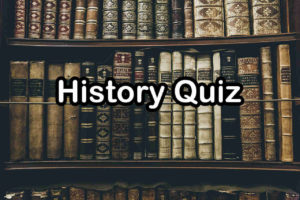History Quiz Questions

1) Who wrote the Greek tragedy Antigone?
Answer: Sophocles.
Sophocles was a literary genius and a prominent playwright. He was one of three ancient Greeks tragedians whose plays have survived. He was born sometime between 496 and 480 BC in Colonus, Athens to a wealthy family.
2) The Pope is the head of what is now the Catholic Church. Who is recognized as the first Pope?
Answer: St. Peter.
3) A characteristic of the human species before the advent of civilization was:
Answer: The ability to spread to various geographic settings and climate zones.
4) What Japanese ruling faction was destroyed by the full-scale civil war that raged from 1467 to 1477?
Answer: The Ashikaga.
The Ashikaga shogunate ruled Japan from 1336-1573, spanning a total of 237 years. This period of time was significant for many reasons, not least because it helped shape Japan into what it is today.
There are many different ways that the Ashikaga shogunate influenced Japan and the world in general, but one of the most prominent ways was through their advancements in warfare. They were responsible for many military innovations that changed how battles were fought around the world, including things like gunpowder weapons and firearms. Another major legacy left behind by this dynasty was a greater literacy rate in Japan which helped promote a large body of literature that we know today as classical Japanese
5) Name the West Asian site which, apart from being mentioned in the Bible, is supposed to have first seen irrigation in West Asia:
Answer: Jericho.
The city of Jericho is mentioned in the Bible over 40 times. It was the first Canaanite city conquered by the Israelites after they left Egypt. The city was located in an area east of the Jordan River which was known as the ‘land of Canaan’.
6) Who was the first U.S. President to be born in Tennessee?
Answer: Andrew Jackson.
Andrew Jackson was the seventh president of the United States. He was born in 1767 in the Waxhaws region of the Carolinas, which today is part of both North and South Carolina. He fought in the American Revolutionary War and was appointed a district judge at age 23. He served in both the U.S. House of Representatives and Senate prior to becoming president in 1829.
7) Of the four gospels (Matthew, Mark, Luke, John), which was written first?
Answer: Mark.
Mark is the second gospel in the New Testament. The author was not an apostle, despite the title of the book. The gospel is believed to have been written between AD 70–90, with a range of possibility between AD 65–110. The anonymous author was, according to some scholars, a man who was not a professional writer but rather a collector of Jesus’ sayings, who was instructed by Peter to write only what he knew of Jesus’ life and teachings.
8) Egypt differed from Mesopotamian civilization by stressing:
Answer: well-organized, durable empires.
Ancient Egypt is often remembered for the iconic structures like the great Pyramids of Giza or the Sphinx. However, it’s the people who make the history. The pyramids were built by thousands of workers, craftsmen, and engineers. Egyptians used to be known as great sailors and builders. Their contributions to math, engineering, geometry, architecture, astronomy, arts, and culture are still relevant today.
9) What were the reforms enacted in 646 that intended to thoroughly incorporate Chinese culture and political structure into Japanese society?
Answer: Taika.
The Taika Reforms (斯外家政, Sushiwake no Seiji?) was a reformation directed at the administrative, social and economic structure of Japan in 645 and 646 in the reign of the Emperor Kōtoku (弘徳天皇, Kōtoku-tennō?). The reforms were intended to consolidate and strengthen the power of the ruling government.
10) The long-remembered destruction of Babylon and the downfall of Hammurabi’s dynasty after 1595 B.C. was effected by Mursilis I, of which race?
Answer: Hittite.
The Hittites were an ancient people who created an empire centered in north-central Anatolia (in modern Turkey) and had great influence in the Ancient Middle East. The empire lasted from approximately 1600 BC to 1180 BC.
11) What is the most common Christian name of U.S. Presidents?
Answer: James.
12) What group conquered the Russians, Ukrainians, and Siberians in the 13th century and established the Empire of the Golden Horde?
Answer: Tartars.
The origin of the word Tartar is Mongolian, meaning ‘A member of a Turkic-speaking group of Mongolic tribes that established the largest contiguous empire in history, based in Central Asia.’ They moved westwards to Europe and southwards down the Silk Road through the Middle East. The Mongol invasion of Europe in the 13th century, was one of the defining moments in history, it saw the pinnacle of the Tartar Empire.
13) Chinese views of nature emphasized:
Answer: Harmony and balance.
The Chinese believe that the Universe is governed by a harmonious and balanced whole. The emphasis on achieving harmony and balance is very much a part of Chinese thinking.
In the Analects, Confucius talks about balance and harmony as fundamental principles. In this chapter, Confucius talks about the importance of being balanced and how that leads to harmony. Being balanced isn’t just a simple task that can be achieved by following a few steps. It takes a lot of time and dedication to achieve balance and harmony.
14) What religion played a key role in the transmission of Chinese civilization to Japan:
Answer: Buddhism.
Buddhism is a religion and philosophy that originated in India that focuses on individual spiritual development, as well as its relationship to human beings, nature, and the universe. It has been practiced in the Nothern areas of the Indian subcontinent, including Nepal, India, Bhutan, Afghanistan, Tibet, and Sri Lanka.
15) Name the Sumerian God, who was the divine sovereign and the final repository of heavenly authority:
Answer: Anu.
In ancient Mesopotamia, Anu was the god of the sky, the son of the god Enlil and the goddess Ninlil. In some texts Anu is also known as An, as a prefix to his name, as an alternative spelling of Anu, as a variant of Ann and as a Sumerogram representing the Sumerian word an “sky, heaven”.
16) How many states did Richard Nixon carry in the 1972 election?
Answer: 49.
Richard Nixon was the 37th President of the United States, serving from 1969 to 1974. He had previously served as the 36th Vice President of the United States from 1953 to 1961, and prior to that as a U.S. Representative and also Senator for the state of California.
17) Who was the first to translate the Bible from Latin to English?
Answer: John Wycliffe.
In 1382, a middle-aged man walked into a church, bent over a manuscript and began to write. What he produced would be the first translation of the Bible into English — and it would spark a revolution. It was the work of John Wycliffe (c1330-84), who is often referred to as the father of the English Reformation.
18) Buddhism differed from Hinduism by not believing:
Answer: In the caste system.
One of the worlds oldest religions, Buddhism is not only unique in beliefs and culture but also in the vast number of languages it is practiced in. Originating in India around 3,000 years ago, Buddhism has changed dramatically over the years and the teachings of the Buddha are now shared by people across the world.
19) While Egypt sank into decline, this ruler built enormous temples, enriched the priestly class tremendously and shifted to a new capital, Piramesse. Name him:
Answer: Ramesses II
Ramesses II (also known as Ramesses the Great and also as Ozymandias) was the third pharaoh of the Nineteenth Dynasty. He often is regarded as the greatest, most celebrated, and most powerful pharaoh of the Egyptian Empire. His successors and later Egyptians called him the “Great Ancestor”.
20) In what year was the Irish poet William Butler born?
Answer: 1865.
William Butler Yeats was an Irish poet, playwright, and politician. A pillar of both the Irish and British literary establishments, in his later years he served as a Senator for Ireland and was a driving force behind the Abbey Theatre. He was a driving force behind the Irish Literary Revival along with Lady Gregory, Edward Martyn and others.
Read more > Quiz Questions and Answers

